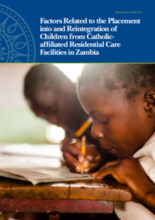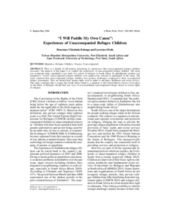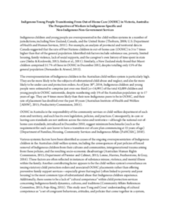Displaying 11051 - 11060 of 14428
This is a study from Catholic Relief Services that investigates the factors related to children’s placement in Catholic-affiliated residential care facilities in Zambia. According to this study, the government estimates that there are approximately 190 residential-care facilities located in Zambia, and of those 40 are Catholic-affiliated. At the time of this study, there were 1674 residents living in residential care.
This study reported that unaccompanied refugee children face greater challenges compared to their accompanied refugee counterparts.
This is an article discussing a research study performed to determine the best forms of out of home care for children.
This is a 15 month qualitative study involving semi-structured interviews with families and boys at three stages: preparing for return, in the first three months of reintegration and successfully reintegrated.
This article investigates the current leaving care and post-care supports that are available to Indigenous care leavers in Australia.
This article studies different medical and psychological models of orphanhood and the effects these models have on the resiliency of orphanhood.
This paper highlights the difficulties faced by foreign minors and how the gaps in law leave them undocumented, vulnerable and unable to access social services. This paper also discusses how South Africa’s approach to accompanied and unaccompanied foreign minor children provides no durable long term solutions for these children, effectively leaving them in a legal hole once they reach the age of majority.
This article discusses adoption in the international human rights framework. Most specifically, it focuses on the rights of the child and how to proceed with adoptions by keeping in mind the best interest of the child.
Meant to highlight the maxim that every child deserves the best that we all have to give; this book provides a review of the progress made since The UN Convention on the Rights of the Child. It contains reports from 21 countries on the status of the rights of the child. The countries are: Australia, Canada, Croatia, Denmark, France, Germany, Greece, India, Iran, Japan, Portugal, Romania, Scotland, Serbia, Solomon Islands, Spain, the Netherlands, the UK, the USA, Uzbekistan and Venezuela. There are no reports from Africa.
This article examines the cultural differences Korean adoptees perceived when interacting with their birth families along with the impact of these perceived differences. The article points out that there has been little research on transnational adoptees, as most research focuses on domestic adoptees. The researchers interviewed 19 adoptees and examined their perceived differences. They found that differences had a wide variety of impacts on the participants’ sense of belonging.





